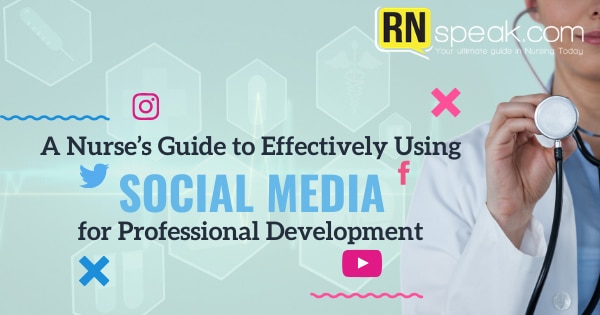Some nurses are social media superstars. They’ve become a go-to resource for general health care inquiries. They serve as a frequent commenters on forums and navigate online chat rooms to discuss healthcare matters. Some even use YouTube to explain different procedures and fascinate their followers. Twitter and Facebook already have a thriving community of nurses, and now Instagram too has trending hashtags on nurses & nursing.
But for the rest of us, social media can be a mystery box because social media platforms, apart from helping us win an online reputation, can also lead to unexpected consequences if we don’t follow a set of guidelines. So, it is paramount that all healthcare workers, including nurses, understand their NMC guidelines and local policies when using social media platforms for professional purposes.
And that’s why we ask —why should nurses use social media for professional development?
Why Should Nurses Use Social Media?
Nurses do essential work. And, in a more grateful world, their work would speak for itself. Like many doctors and surgeons, nurses can also leverage the power of social media to boost their online reputation, share their challenging experiences, and outshine.
According to James Gillespie of the Center for Healthcare Innovation, “health care providers can use social media to partner with patients, families, and communities to effectively meet patients’ needs. The voice of the patient must be heard to provide patient-centered care.”
Besides, nurses can use many more ways to use Instagram, Twitter, and online communities to increase the following and make a difference in patients’ lives. Let’s look at some of the solid reasons why nurses should consider social media as a tool for professional development.
- The Opportunity to Reach more People & Patients:
With Social Media platforms, you can interact with more people than just the patients in your practice. Every time you’re posting or interacting on a forum, you’re putting yourself in a position to reach a new audience. As a rule of thumb, the content amount and quality you share on social media are directly proportional to the increase in audience reach.
- An Outlet to Share Knowledge and Expertise
Your profile can be a go-to source for people to stay updated with the latest information in your field. You can dispel common medical myths, share authentic news, and news updates on medical breakthroughs and health trends. You can display the knowledge you’ve acquired over the years and provide support by sharing statistics and tips about self-care, nutrition, and whatever that’s relevant for your patient base.
- A Platform to Acquire Knowledge & Network
Social Media platforms also enrich your ability to stay up to date with trends. And hence, knowledge sharing doesn’t have to be one way. By interacting with other nurses, healthcare workers, and doctors, you stay updated with trends and get insight into the minds of other experts.
For example, you can join relevant Facebook and LinkedIn groups to say abreast of upcoming conferences, workshops, and the latest news in the field. You can use these sites to connect with other health professionals, acquire knowledge, and receive support.
How Can Nurses Use Social Media Effectively
Social media for nurses may not provide ROI right away, but it takes time. If you’re worried you won’t benefit from it, check out the Do’s and Don’t use social media effectively.
Social Media for Nurses: Do’s
Blogging: Nurses can use blogging platforms like WordPress, Joomla, BlogSpot to boost their online visibility and advance their careers — landing a new job, promotion, or a raise. Maintaining a blog also gives them a chance to stay updated with the latest information, teach others, and expand their knowledge. They can also use the same platform to promote nursing-related interests or endeavors or generate a side income.
Twitter or LinkedIn: LinkedIn and Twitter are some of the easiest ways of maintaining contact with peers, experts, and other professionals. From explaining the introduction of a new drug, health campaigns, new device, drug recall, health safety notices to answering the emergency question — the nurses today can do so much. These platforms are a great place to start health-related conversions and trend it with hashtags.
Facebook, Instagram, & YouTube: These platforms’ visual and audio aspects have allowed nurses to vlog easily. Where YouTube has a profound effect on a viewer’s understanding of medical concerns, treatments, and surgical procedures, Instagram will enable them to share snippets and snaps on the trending topics.
Tiktok: TikTok isn’t only for lip-syncs, music, or mimicry. Because of its surplus of users, brands have started using the app for marketing and advertising purposes. And hence, this platform can be a great asset for nurses too. They can share use the app to share knowledge, ideas, home remedies or tips, ask for information, explain procedures, and debate issues.
Forums and Discussion Groups: Nurse-specific forums are one of the most interactive places where nurses can interact with nurses from all walks of life. From receiving tips on coping with workplace stress to sharing advice on nursing degree programs, there’s always so much to teach and learn.
Social Media for Nurses: Dont’s
As per the American Nursing Association’s Guidelines, Nurses or healthcare workers are not supposed to disparage comments about their patients. They should not use the platform to share how rude, unhygienic, or ignorant the patient is — such statements leave an unprofessional impression on the audience.
This might seem like a no-brainer, but nurses get overwhelmed and hence frustrated in many medical situations. Hence, the ANA stresses that they refrain from making any negative remarks about the patient. Nurses (like all health care workers) must remain vigilant to avoid disclosing workplace and patient-related information and follow the relevant federal and state laws. Even a seemingly candid or innocuous post of a patient’s personal information can result in dismissal from employment.
“Nurses should remember they should not post information that might violate HIPAA regulations, just as they would not talk about patients’ information openly in a hospital hallway where others could overhear. Protecting the privacy and preventing people from breaking the law are two of the biggest goals of the ANA’s principles.” — Code of Ethics for Nurses with Interpretive Statements.
Breaches of patient confidentiality can occur in many different forms, including:
- Videos or photos of patients
- Photos or videos that reveal patient records
- Patient’s description, diagnosis, treatments, or diagnosed medicines
- Discussing a patient in a degrading or demeaning manner
Considering the visibility that social media provides, nurses need to maintain professionalism and composure. Because of the nature of work, nurses are often compelled to blow off work-related steam by ranting about their administrators, job duties, coworkers, and worker policies. While we’re free to voice our opinions, offensive comments can hurt the reputation of the person.
Putting it All Together
In conclusion, social media sites offer great potential for nurses to share and acquire more knowledge from the online community. Sites like Facebook, LinkedIn, Instagram, and Twitter hold unlimited opportunities if you’re willing to invest the time and effort into doing it well.
But the key to successfully managing the ups and downs of social media presence is finding a safe and responsible middle ground between professional and personal habits without breaking patient confidentiality and privacy.








![13 Free Online Continuing Professional Development (CPD) Resources for Nurses [2025] free cpd for nurses](https://rnspeak.com/wp-content/uploads/2020/07/free-cpd-for-nurses-238x178.jpg)




